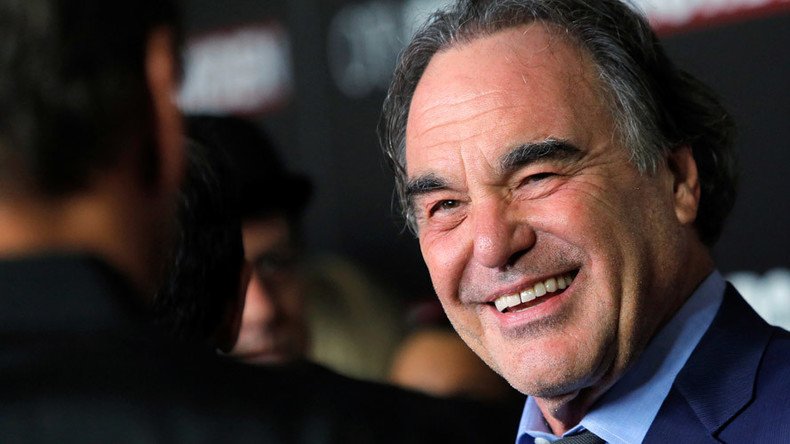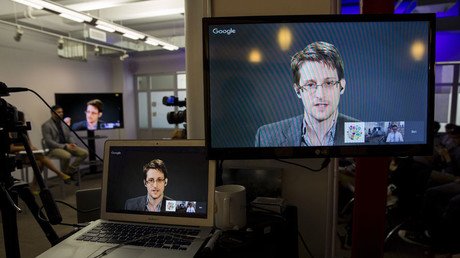‘It’s difficult now to criticize America as we did in 70s’ – Oliver Stone

My problem is that I would like to know the truth, and the world is really crazy right now; it has kind of gone upside-down, film director Oliver Stone told RT’s Going Underground.
RT: On Monday NatWest, the UK bank servicing RT UK, notified that it will close the broadcaster’s accounts, without giving any explanation. What do you think it says about the level of press freedom in Britain?
UK media tries to spin NatWest’s closure of RT’s British accounts, but facts remain the same https://t.co/mLGPd79pvC
— RT (@RT_com) 19 октября 2016 г.
Oliver Stone: RT has always been responsible. They are very clear about the facts, seems to me. And they show filmic evidence. Maybe you’re a threat; they consider you propagandistic. But when I read these London papers I wonder who is propagandistic here. It seems that it is a media war, but it is really a shame that the truth has been sacrificed. The British people are not getting the news, unless you allow other points of view – Al Jazeera, France 24 comes to mind, RT comes to mind. Listen to the news.
Love, cyberwarfare & govt secrets: @TheOliverStone talks new '#Snowden' movie (EXCLUSIVE) https://t.co/sLqabXThybpic.twitter.com/vILBaS5Xod
— RT (@RT_com) 20 сентября 2016 г.
If you want, you’re going to create enemies, and say you have enemies and you should know your enemy. I’ve always held to that principal, that is why interviewed [Fidel] Castro, [Hugo] Chavez; I am interviewing [Vladimir] Putin; going back to finish that documentary next year. It is important to know who you’re talking to and have respect for the multinational, the multipolar point of view.
RT: You met UK Labour Party leader Jeremy Corbyn, who is accused daily in the Western mainstream media of being an anti-Semite Kremlin apologist. What do you think of him?
OS: Anybody who says anything positive about Russia… They were an ally in the war on terror, if you remember, they gave us access to Afghanistan, and so forth, and they helped us in any way they could; they have been the most effective in fighting terror themselves in Russia and around it; they had a heavy Muslim situation. And they are also very effective against ISIS in Syria. They flew, I believe, more than 100 sorties…a day. I think they did a lot of damage - physiologically certainly - and destroyed the strength of backbone of ISIS. That was a key moment.
Then they went into a lower mode, and ever since the US was flying one –two sorties a day…Then the US has stepped up this propaganda warfare. The US accused Russia of having destroyed the humanitarian mission into Syria without evidence. Then Mr. Putin has presented very interesting evidence that there was indeed terrorists who did this attack, because that sounds like that is something they do.
But the US is not interested in proof anymore – it seems like they just want to make the news and keep it up, distract you with more news, more news, and more news, and more attacks. It is really scary. I don’t know what the intention is of the US to bring this to a head.
RT: You continue to make these films that reevaluating the past…
OS: My problem is that I would like to know the truth. And the world is really crazy right now – it has kind of gone upside-down.
RT: The Academy Awards committee has been giving awards to films like “Zero Dark Thirty” and “Argo.” What are the dangers of people like Kathryn Bigelow and Ben Affleck, and what they are doing versus what you are doing about reevaluating history?
OS: Well, we know that they were helped by the CIA. The CIA has a program to certainly help entertainment influence, entertainment on television shows; they are involved; they always provide assistance. But you know what kind of assistance this is – it is based in the script.
RT: You’ve never been helped by them in your films, have you?
OS: Never was. On the contrary, I’ve been attacked by them. But this is true also for the Defense Department and military machinery. The scripts are again very pro-American. It is very difficult at this stage to criticize America, as we did it in the 1970s, because we care about our country, we believe in reform. Much of the dissolution of the Vietnam War was put into those films that were made in 1970s. They were very popular. But they were also heavily criticized. Since Reagan came in 1980 I think you’ll find that there was a serious attempt on the part of the Conservative groups to regain the media control that they now have.
The statements, views and opinions expressed in this column are solely those of the author and do not necessarily represent those of RT.













